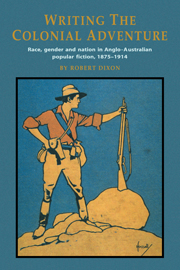 Writing the Colonial Adventure
Writing the Colonial Adventure Book contents
- Frontmatter
- Contents
- List of Illustrations
- Acknowledgements
- Introduction
- 1 The Romance of Property: Rolf Boldrewood and Walter Scott
- 2 Outlaws and Lawmakers: Boldrewood, Praed and the ethics of adventure
- 3 Israel in Egypt: The significance of Australian captivity narratives
- 4 Imperial Romance: King Solomon's Mines and Australian romance
- 5 The New Woman and the Coming Man: Gender and genre in the ‘lost-race’ romance
- 6 The Other World: Rosa Praed's occult fiction
- 7 The Boundaries of Civility: Australia, Asia and the Pacific
- 8 Imagined Invasions: The Lone Hand and narratives of Asiatic invasion
- 9 The Colonial City: Crime fiction and empire
- 10 Beyond Adventure: Louis Becke
- Conclusion
- Notes
- Select Bibliography
- Index
9 - The Colonial City: Crime fiction and empire
Published online by Cambridge University Press: 05 November 2011
- Frontmatter
- Contents
- List of Illustrations
- Acknowledgements
- Introduction
- 1 The Romance of Property: Rolf Boldrewood and Walter Scott
- 2 Outlaws and Lawmakers: Boldrewood, Praed and the ethics of adventure
- 3 Israel in Egypt: The significance of Australian captivity narratives
- 4 Imperial Romance: King Solomon's Mines and Australian romance
- 5 The New Woman and the Coming Man: Gender and genre in the ‘lost-race’ romance
- 6 The Other World: Rosa Praed's occult fiction
- 7 The Boundaries of Civility: Australia, Asia and the Pacific
- 8 Imagined Invasions: The Lone Hand and narratives of Asiatic invasion
- 9 The Colonial City: Crime fiction and empire
- 10 Beyond Adventure: Louis Becke
- Conclusion
- Notes
- Select Bibliography
- Index
Summary
What connection can there have been between many people in the innumerable histories of this world, who, from opposite sides of great gulfs, have, nevertheless, been very curiously brought together!
Charles Dickens, Bleak HouseIt is a commonplace to remark that the late Victorian and Edwardian years were a golden age of crime fiction. This chapter relates the flourishing of the genre at that time to the imperial context by arguing that it was an important site for the narration of both national and imperial identities. It is perhaps for this reason that a number of writers whose work had strong colonial connections, such as Fergus Hume and Guy Boothby, became internationally best-selling authors, rivalling in sales the likes of Arthur Conan Doyle and H.G. Wells. As John M. MacKenzie observes, the detective novel burgeoned precisely at that moment in the history of empire when the internal conflicts contained by the concept of ‘the nation’ were externalised on to the larger field of ‘the empire’. By the same argument, the fractures in imperial identity manifest in the mounting international tensions leading to World War I were expressed in narratives of domestic crime and conflict. The readings in this chapter move from the ‘internal’ conflicts enacted in Fergus Hume's best-selling detective novel The Mystery of a Hansom Cab, which is set in Melbourne, to their enactment on the imperial stage in the Doctor Nikola novels of Guy Boothby.
- Type
- Chapter
- Information
- Writing the Colonial AdventureRace, Gender and Nation in Anglo-Australian Popular Fiction, 1875–1914, pp. 155 - 178Publisher: Cambridge University PressPrint publication year: 1995
